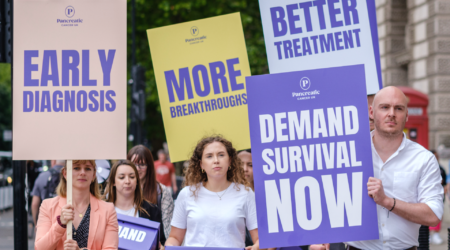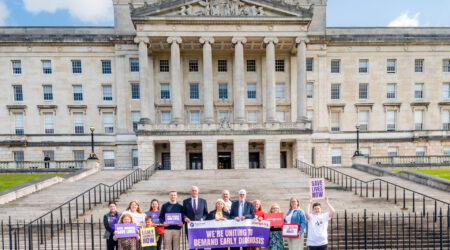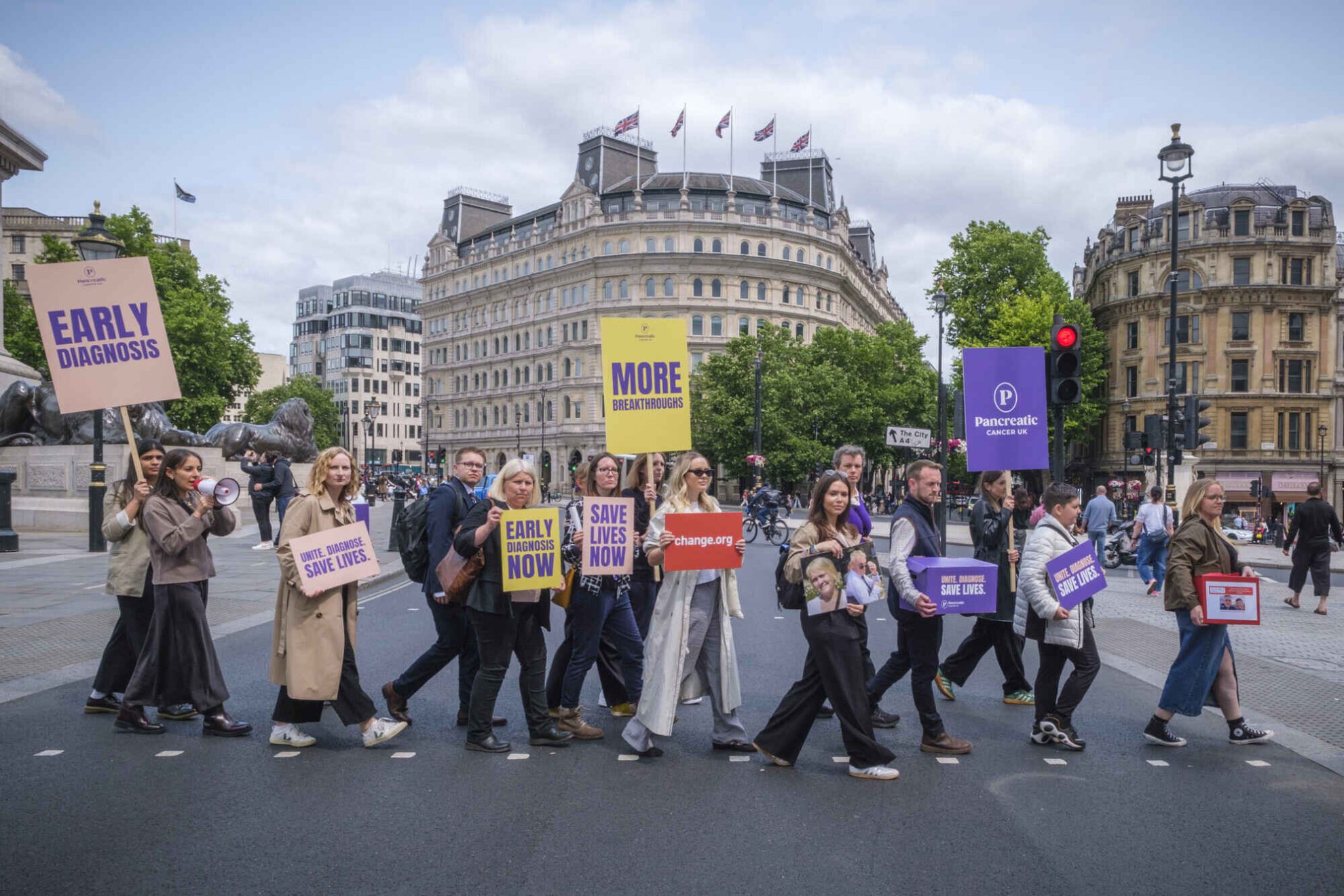

Five ways we’re influencing the new Cancer Plan
We’re shortly expecting the publication of National Cancer Plan for England, which could be a game–changer for people with pancreatic cancer.
Our Head of Health Influencing and Policy Alfie Bailey-Bearfield shares the broad range of approaches we’re taking to make sure it has a lasting impact.
Survival rates for many cancers improved dramatically in recent years. And yet half of people with pancreatic cancer are still dying within three months of diagnosis.
But this year, we’ve got an important opportunity to change this. On World Cancer Day in February, the UK Government launched a consultation on its new National Cancer Plan.
This plan will lay out what the Government will do to improve survival of cancer and will focus on prevention, early diagnosis, treatment, living with and beyond cancer, and research and development.
Pancreatic cancer and other less survivable cancers have not seen the progress of other cancers in recent years, and we need the plan to address this – once and for all.
Seizing the opportunity for change
Over the last 7 months we’ve been doing all we can to seize this vital opportunity to transform outcomes for people pancreatic cancer and the other less survivable cancers.
In addition to responding to the consultation, we have been taking a broad range of approaches to make sure the plan has a lasting impact.
By uniting with people affected by pancreatic cancer, health professionals, researchers and many other cancer charities we’ve worked hard to get our collective voices heard.
Here are some of the ways we’ve been raising our voices together:
1. Hundreds of people affected by pancreatic cancer have shared their experiences
Over 140 supporters told us they completed a full response to the Government’s consultation, with more than 1,000 accessing our guidance on the website.
By sharing their loved ones experiences, our supporters have demonstrated the urgency of addressing the issues facing pancreatic cancer.
Many of our supporters mentioned pancreatic cancer and key phrases about early diagnosis, better treatment and more research for pancreatic cancer throughout their response, which will make our cause stand out among the 11,000 of responses submitted.
I have just completed the survey and flooded every one of my answers with the words PANCREATIC CANCER!! We need to be heard and myself, family and friends fully support and stand together with you all.
2. We’ve joined up with like-minded organisations
There are hundreds of cancer charities asking for their own cause to be the number one priority in the plan, and it is impossible for the government to include them all. This makes it hard for individual charities to stand out from the crowd.
In addition, decision makers are far more likely to adopt solutions that meet the needs of several of cancers facing similar issues rather than just one. This allows them to have a greater and more cost-effective impact across several cancer types, and save more lives, in comparison to improving outcomes for one cancer at a time.
By working alongside like-minded cancer charities as part of strong coalitions, such as the Less Survivable Cancers Taskforce and Cancer 52 – a coalition representing rare and less common cancers – we’ve been able to cut through the noise.
Joining with the Cancer 52 coalition for example, we have developed strong joint recommendations to Government and had the opportunity to attend high profile meetings with senior Department of Health and Social Care officials to influence the plan.
3. We’ve involved the pancreatic cancer clinical community
Health professionals have a powerful and important role in shaping the cancer plan.
That’s why we brought together dozens of clinical experts working in pancreatic cancer, including surgeons, cancer nurse specialists, dietitians and palliative care professionals, to agree on the top priorities they wanted to see in the plan.
Following workshops with this community we included their powerful recommendations in our own response and raised them in our discussions with decision makers.
4. We’ve worked directly with the Government shape its plan
The Government set up several ‘reference groups’ of experts from NHS organisations, health bodies and patient representative bodies. Their aim was to provide advice on the development of the plan.
As a charity, we were invited to join one of these groups to represent people with pancreatic cancer and the other less survivable cancers. As a result, we were in a powerful position talk straight to the people writing the plan.
The invitations to sit on these high-profile groups reflect the growing awareness of pancreatic cancer and the less survivable cancers in this Government. This is in large part thanks to thousands of our incredible supporters who’ve raised their voices through our campaigns over recent years. Thank you.
5. Together, we’ve been impossible to ignore
Thanks to over 70,000 of our incredible supporters who signed our Unite. Diagnose. Save Lives campaign calling for the prioritsation of pancreatic cancer in the caner plan, we’ve been hard to ignore.
This June we made a huge impact at 10 Downing Street when we handed in our open letter, as part of a tour of all UK parliaments. This resulted in pancreatic cancer being raised in the House of Commons and prompted a response from the Department for Health.
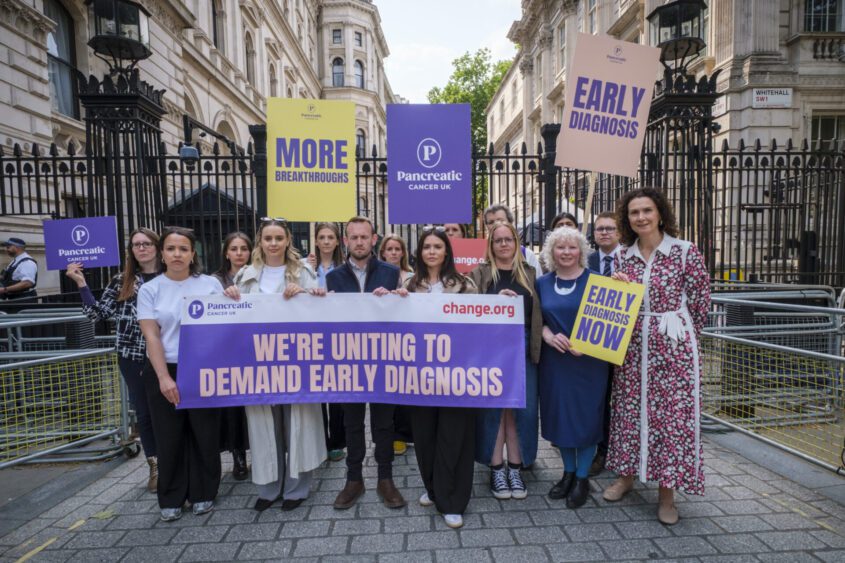
In August we joined forces with over 60 charities as part of the One Cancer Voice coalition to call on them to make sure the cancer plan delivers real change for everyone affected by cancer. We got together outside the Houses of Parliament to to show the Government that they cannot ignore us. We will continue to hold them to account when the plan is launched this autumn.
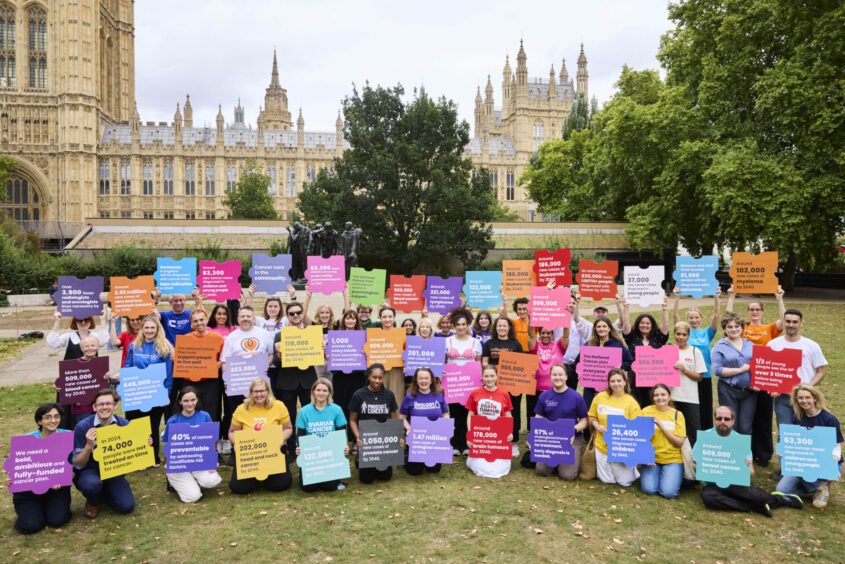
The Government is expected to publish its National Cancer Plan before the end of 2025. We’ll update our supporters with important news about the plan as soon as we hear. In the meantime, if you have any questions please contact our team by emailing campaigning@pancreaticcancer.org.uk.
This autumn could be a game changer for people with pancreatic cancer. The Cancer Plan is one of many important opportunities coming up in parliaments across the UK. You can find out more about opportunities in our blog posts about exciting developments in Westminster and Scotland, Northern Ireland and Wales.

